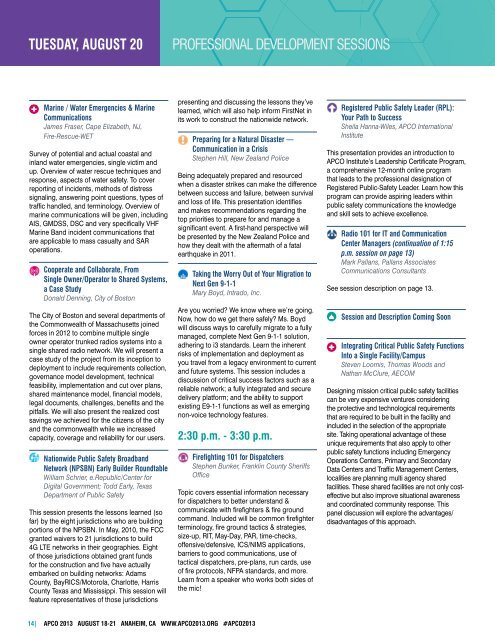Attendee Brochure - APCO 2013
Attendee Brochure - APCO 2013
Attendee Brochure - APCO 2013
You also want an ePaper? Increase the reach of your titles
YUMPU automatically turns print PDFs into web optimized ePapers that Google loves.
TUESDAY, AUGUST 20<br />
Professional Development Sessions<br />
Marine / Water Emergencies & Marine<br />
Communications<br />
James Fraser, Cape Elizabeth, NJ,<br />
Fire-Rescue-WET<br />
Survey of potential and actual coastal and<br />
inland water emergencies, single victim and<br />
up. Overview of water rescue techniques and<br />
response, aspects of water safety. To cover<br />
reporting of incidents, methods of distress<br />
signaling, answering point questions, types of<br />
traffic handled, and terminology. Overview of<br />
marine communications will be given, including<br />
AIS, GMDSS, DSC and very specifically VHF<br />
Marine Band incident communications that<br />
are applicable to mass casualty and SAR<br />
operations.<br />
Cooperate and Collaborate, From<br />
Single Owner/Operator to Shared Systems,<br />
a Case Study<br />
Donald Denning, City of Boston<br />
The City of Boston and several departments of<br />
the Commonwealth of Massachusetts joined<br />
forces in 2012 to combine multiple single<br />
owner operator trunked radios systems into a<br />
single shared radio network. We will present a<br />
case study of the project from its inception to<br />
deployment to include requirements collection,<br />
governance model development, technical<br />
feasibility, implementation and cut over plans,<br />
shared maintenance model, financial models,<br />
legal documents, challenges, benefits and the<br />
pitfalls. We will also present the realized cost<br />
savings we achieved for the citizens of the city<br />
and the commonwealth while we increased<br />
capacity, coverage and reliability for our users.<br />
Nationwide Public Safety Broadband<br />
Network (NPSBN) Early Builder Roundtable<br />
William Schrier, e.Republic/Center for<br />
Digital Government; Todd Early, Texas<br />
Department of Public Safety<br />
This session presents the lessons learned (so<br />
far) by the eight jurisdictions who are building<br />
portions of the NPSBN. In May, 2010, the FCC<br />
granted waivers to 21 jurisdictions to build<br />
4G LTE networks in their geographies. Eight<br />
of those jurisdictions obtained grant funds<br />
for the construction and five have actually<br />
embarked on building networks: Adams<br />
County, BayRICS/Motorola, Charlotte, Harris<br />
County Texas and Mississippi. This session will<br />
feature representatives of those jurisdictions<br />
presenting and discussing the lessons they’ve<br />
learned, which will also help inform FirstNet in<br />
its work to construct the nationwide network.<br />
Preparing for a Natural Disaster —<br />
Communication in a Crisis<br />
Stephen Hill, New Zealand Police<br />
Being adequately prepared and resourced<br />
when a disaster strikes can make the difference<br />
between success and failure, between survival<br />
and loss of life. This presentation identifies<br />
and makes recommendations regarding the<br />
top priorities to prepare for and manage a<br />
significant event. A first-hand perspective will<br />
be presented by the New Zealand Police and<br />
how they dealt with the aftermath of a fatal<br />
earthquake in 2011.<br />
Taking the Worry Out of Your Migration to<br />
Next Gen 9-1-1<br />
Mary Boyd, Intrado, Inc.<br />
Are you worried? We know where we’re going.<br />
Now, how do we get there safely? Ms. Boyd<br />
will discuss ways to carefully migrate to a fully<br />
managed, complete Next Gen 9-1-1 solution,<br />
adhering to i3 standards. Learn the inherent<br />
risks of implementation and deployment as<br />
you travel from a legacy environment to current<br />
and future systems. This session includes a<br />
discussion of critical success factors such as a<br />
reliable network; a fully integrated and secure<br />
delivery platform; and the ability to support<br />
existing E9-1-1 functions as well as emerging<br />
non-voice technology features.<br />
2:30 p.m. - 3:30 p.m.<br />
Firefighting 101 for Dispatchers<br />
Stephen Bunker, Franklin County Sheriffs<br />
Office<br />
Topic covers essential information necessary<br />
for dispatchers to better understand &<br />
communicate with firefighters & fire ground<br />
command. Included will be common firefighter<br />
terminology, fire ground tactics & strategies,<br />
size-up, RIT, May-Day, PAR, time-checks,<br />
offensive/defensive, ICS/NIMS applications,<br />
barriers to good communications, use of<br />
tactical dispatchers, pre-plans, run cards, use<br />
of fire protocols, NFPA standards, and more.<br />
Learn from a speaker who works both sides of<br />
the mic!<br />
Registered Public Safety Leader (RPL):<br />
Your Path to Success<br />
Sheila Hanna-Wiles, <strong>APCO</strong> International<br />
Institute<br />
This presentation provides an introduction to<br />
<strong>APCO</strong> Institute’s Leadership Certificate Program,<br />
a comprehensive 12-month online program<br />
that leads to the professional designation of<br />
Registered Public-Safety Leader. Learn how this<br />
program can provide aspiring leaders within<br />
public safety communications the knowledge<br />
and skill sets to achieve excellence.<br />
Radio 101 for IT and Communication<br />
Center Managers (continuation of 1:15<br />
p.m. session on page 13)<br />
Mark Pallans, Pallans Associates<br />
Communications Consultants<br />
See session description on page 13.<br />
Session and Description Coming Soon<br />
Integrating Critical Public Safety Functions<br />
Into a Single Facility/Campus<br />
Steven Loomis, Thomas Woods and<br />
Nathan McClure, AECOM<br />
Designing mission critical public safety facilities<br />
can be very expensive ventures considering<br />
the protective and technological requirements<br />
that are required to be built in the facility and<br />
included in the selection of the appropriate<br />
site. Taking operational advantage of these<br />
unique requirements that also apply to other<br />
public safety functions including Emergency<br />
Operations Centers, Primary and Secondary<br />
Data Centers and Traffic Management Centers,<br />
localities are planning multi agency shared<br />
facilities. These shared facilities are not only costeffective<br />
but also improve situational awareness<br />
and coordinated community response. This<br />
panel discussion will explore the advantages/<br />
disadvantages of this approach.<br />
14| <strong>APCO</strong> <strong>2013</strong> AUGUST 18-21 ANAHEIM, CA WWW.<strong>APCO</strong><strong>2013</strong>.ORG #<strong>APCO</strong><strong>2013</strong>


